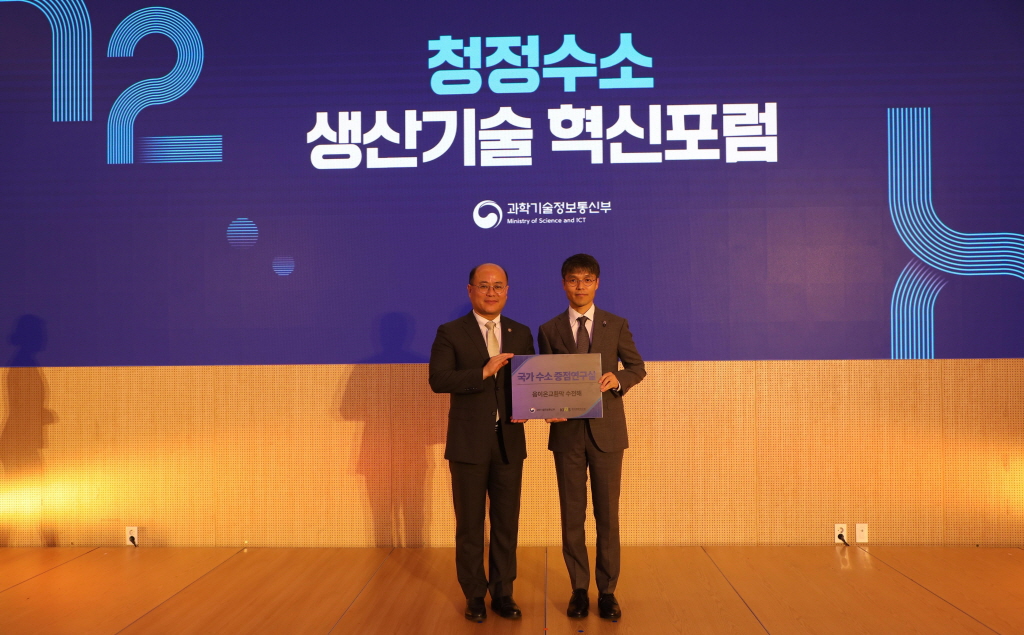한국재료연구원(KIMS, 원장 최철진)이 과학기술정보통신부가 출범한 ‘국가 수소 중점연구실’의 5대 분야 중 하나인 ‘음이온교환막 수전해’ 총괄주관 연구기관으로 지정됐다.
2035년까지 대용량 1MW 시스템 개발 목표
한국재료연구원(KIMS, 원장 최철진)이 국가 수소 중점연구실로 지정되며, 그린수소 국산화를 앞당기기 위해 본격 나선다.
재료연은 과학기술정보통신부가 출범한 ‘국가 수소 중점연구실’의 5대 분야 중 하나인 ‘음이온교환막 수전해’ 총괄주관 연구기관으로 지정됐다고 23일 밝혔다.
국가 수소 중점연구실은 지난 17일 과기정통부에서 국가 연구역량 결집을 통한 2030 수소 기술 국산화율 100% 달성이라는 비전을 가지고 출범했으며, 기술국산화 및 표준화, 국제협력연구 등의 역할을 수행할 예정이다.
재료연이 주관하는 음이온교환막 수전해 분야 중점연구실은 2035년까지 PEM 수전해와 동등한 효율의 대용량(1MW) 시스템 개발을 목표로 한다.
재료연이 지정받은 음이온교환막 수전해 분야는 비귀금속을 사용해 저가로 청정수소를 생산할 수 있는 차세대 수전해 기술 중 하나로, 국가 에너지 자립률 향상과 2050 탄소중립을 가능하게 만드는 기술이다.
재료연은 오랫동안 비귀금속 기반의 음이온교환막 수전해 전주기 연구를 수행해 비귀금속 촉매, 대면적 전극, 고효율 막전극접합체, 고성능/장수명 스택 기술을 확보하는 등 관련 분야에서 괄목할 만한 성과를 냈다.
재료연은 국가 수소 R&D 및 사업화 플랫폼 구축을 통한 차세대 고효율 음이온교환막 수전해 기술을 선도하기 위해 △수소 소재 및 부품화 기술 개발 △기술 인프라 및 사업화 지원 △국제 협력 연구 체계 구축 △기술인증 및 표준화 기반 구축 관련 임무를 수행할 예정이다.
재료연은 성공적인 임무 수행을 위해 국내외 음이온교환막 수전해 전문 산학연 기관들과 컨소시엄을 꾸리는 등 지자체와도 긴밀하게 협력할 예정이다.
재료연 최철진 원장은 “국가 수소 중점연구실 지정은 재료연의 원 승격이 큰 몫을 차지했다. 정부 차원의 국내 소재 기술 개발 필요성이 지속해서 제기됨에 따라 당시 국회의원이던 박완수 경상남도지사의 정책토론회 개최 및 공론화와 노력 등이 큰 역할을 했다”라며 “지금도 경상남도를 비롯한 시군의 지원으로 극한 소재 실증연구 기반 조성 사업 등 여러 사업이 원활하게 추진되고 있어, 앞으로도 음이온교환막 수전해 기술 지원을 통해 경남지역 수소기업에 도움 되도록 연구에 매진하겠다”고 말했다.
한편 과기정통부는 이날 재료연 이외에도 알칼라인 수전해 분야에서 한국에너지기술연구원을, 고분자전해질(PEM) 수전해 분야에서 한국과학기술연구원을, 고체산화물 수전해 분야에서 한국에너지기술연구원을, 액상유기수소 운반체 분야에서 한국화학연구원을 지정했다.
